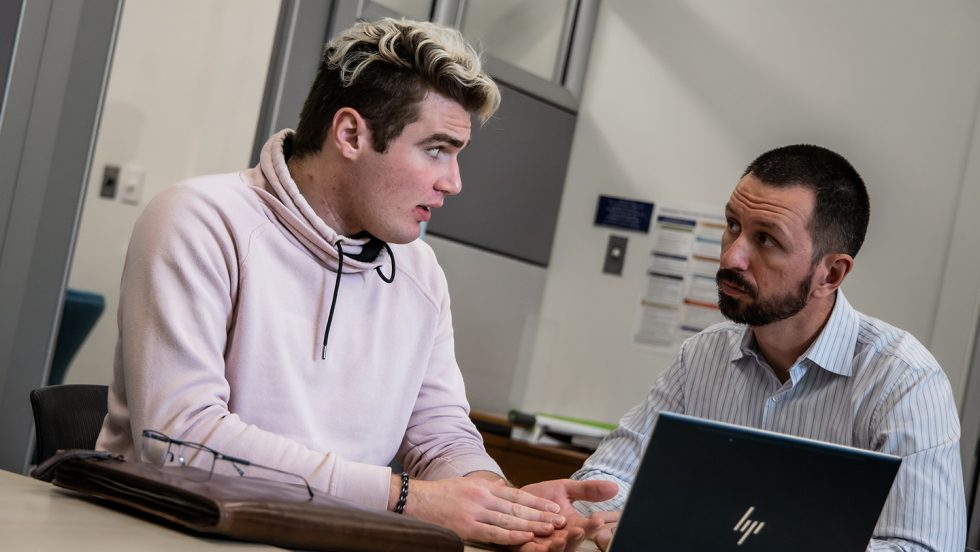The Chronicle of Higher Education Highlights New College of Florida’s Cutting-Edge Career Prep Program

Dwayne Peterson, the executive director of the Center for Career Engagement and Opportunity (CEO), discussed how New College faculty members are collaborating with career educators to integrate career preparation and development into the classroom. It is an approach that scales foundational career skills and prepares all students for the rapidly changing job market.
“We can no longer rely on a peripheral and optional career services delivery model if we want to ensure the successful transition of all students into careers at graduation,” Peterson said. “Academics alone are also not the solution, as employers are expecting students to understand and demonstrate their skills outside of the classroom. So, to meet this expectation, students need intentional training and support to build skills and learn to communicate those skills effectively.”
The only way to ensure that every student receives the training and support they need to be career-ready is to “embrace career education as a learning outcome of the entire academic experience,” Peterson said.
The Chronicle, published since 1966, is the leading source of news, information and jobs for college and university faculty members and administrators. The New Pathways report examined the pressing challenges that higher education institutions face, specifically “a shifting recruitment landscape, the rise of remote work, and persistent inequities in employment outcomes for underrepresented and first-generation students.”
New College is taking all of these factors into consideration. From day one at New College, all students are paired with their own nationally certified career coach/adviser—a luxury that larger colleges cannot provide.
Through the Novo Career Advantage program (a customized four-year career prep plan), New College’s career coaches help students apply for internships and fellowships, guide them through job exploration, and connect them with mentors through the Novo Network Mentorship Program. And nearly every student at New College completes an internship before graduation.
Beyond that, Peterson and his team work directly with professors to infuse the New College curriculum with career-building skills.
“We have always known that our academic program gives students knowledge and skills, such as critical thinking and communication,” Peterson said. “But what’s traditionally a missing component of a broad bachelor’s degree is ensuring that students can see those skills–how the skills connect to careers, and effectively demonstrate competence in that skill to an external non-academic audience (such as an employer) in writing and also verbally.”
During an 18th-century British drama course with New College Professor of English and Gender Studies Miriam Wallace, Ph.D., Peterson developed a workshop in which students were taught about valuable workplace skills based on their own career aspirations. Students were then asked to engage in self-reflection, analyzing where in the course they may have gained those skills.
Rather than write a final paper, students compiled a dramaturgy packet for one of the plays they studied. The students had to research the history of the play, highlight key performances and unpack major themes. Peterson worked with the students on a writing exercise that asked, “What if the course was their only experience? What would they put on their résumé?”
Students realized that they had been learning to use different databases, conducting critical analysis, distilling complex ideas and writing for a popular audience—all in one class. They then practiced writing those skills in a way that employers would understand.
In years past, especially at liberal arts institutions, faculty members and career educators did not collaborate on such a career-focused level. But at New College, this type of collaboration empowers students in all fields of study–from British literature to marine biology–to apply what they’ve learned in the classroom to the workplace.
According to data from the National Survey of Student Engagement (NSSE), students at New College are more likely to participate in career education activities (such as interview prep, résumé review, and career engagement with their professors) than students at other small liberal arts colleges.
“The NSSE data is early evidence that our institutional efforts to scale and integrate careers with academics is working,” Peterson said. “Career planning and preparation are being normalized by students and faculty as an essential academic endeavor, which ensures that all students will be ready for their future by graduation.”
For more information on the Center for Career Engagement and Opportunity (CEO) at New College of Florida, visit ncf.edu/ceo.
For more information on The Chronicle report, visit store.chronicle.com/products/new-pathways-from-college-to-career.
